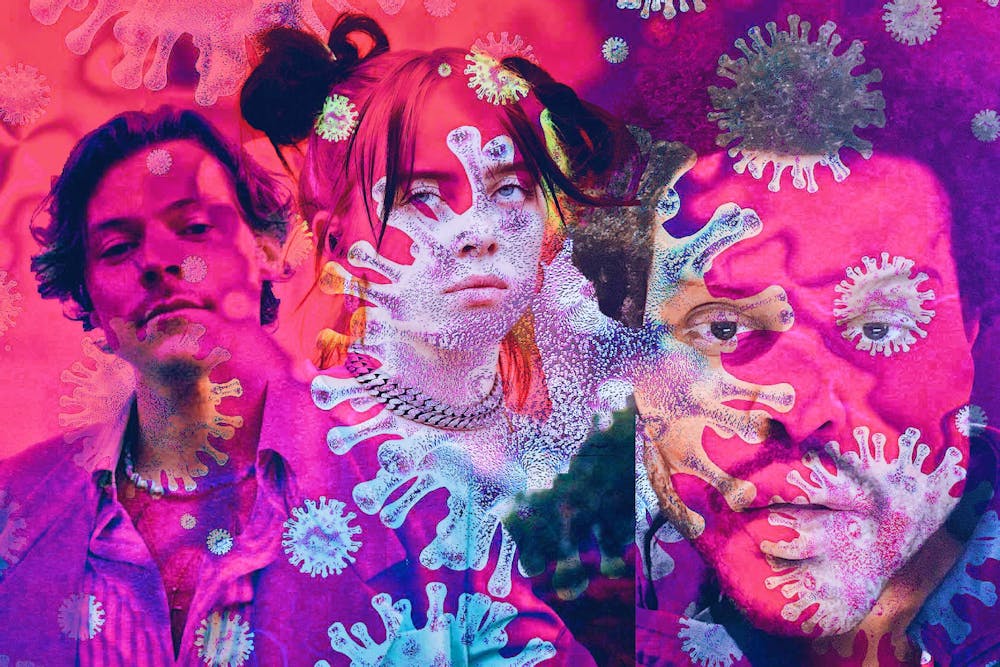Imagine it: the thrashing of the speakers, incandescent lights reflecting against the glazed eyes of fans, sweat saturating the air between the stage and the audience, and a euphoric aura pervading the stadium. That transcendent sensation of being in the presence of live music and exultant people. It all seems completely foreign now.
In light of COVID–19 and the essential restrictions on everyday life, live concert experiences were seemingly some of the first forms of entertainment to fall by the wayside. The failure to maintain necessary distance and circumvent super–spreader events precipitated a cascade of tour cancellations. As an immediate, and now more long–term, consequence of terminating stadium tours, concerts, and festivals, the music industry has confronted dire economic repercussions.
One of the first noticeable results of the pandemic in the music industry was a sharp decline in streaming figures on platforms like Spotify. With these numbers in decline, artists began to postpone album release dates. Lady Gaga, Dua Lipa, Sam Smith, and the 1975 were a few artists out of many to suspend album releases in light of the added stress of COVID–19, and the prospect of losing streams. This, combined with the overwhelming loss of artists’ main revenue stream—live music and concert experiences—has devastated the music industry and its artists in irrevocable ways.
In March last year, the Rolling Stones postponed the North American leg of their No Filter tour. Then in April, the 50th anniversary edition of Roskilde Festival in Denmark—with an impressive lineup featuring Kendrick Lamar, Cage the Elephant, Taylor Swift, Tyler, the Creator, and more—was canceled. Soon, Harry Styles had postponed Love on Tour, along with Billie Eilish, the Weeknd, Justin Bieber, and Halsey. As this persistent surge of cancellations became normalized, the thought of live concerts resuming was seemingly hopeless. However, with a global administration of the vaccine, perhaps fans will once again be washed in the unadulterated explosions of live music.
The question at stake is: Will the music industry ever return to a state of economic and social normalcy?
Specific divisions have taken precautionary measures to ensure stability following lockdown. The Metropolitan Opera, the National Philharmonic, and the Philadelphia Orchestra offer live streaming of events to continue an influx of revenue and maintain a secure fanbase. However, for most artists, streaming online is not a viable long–term replacement for live venue performances. While it was estimated that streaming revenue would equate to $23 billion by 2022, the live music industry was expected to exceed revenues of $31 billion.
Due to the pandemic, these numbers have taken a drastic hit. This respective shutdown has caused an estimated loss of $10 billion in advertisements and scholarships, also paralleled by plummeting stocks in live concert businesses like Live Nation and AEG. Now, more than ever, it is imperative for a rebirth of a live infrastructure.
The first attempt at a return to major festival performances was in Taiwan at the Ultra Music Festival—headlined by Alesso—on Nov. 14. This event was shockingly successful and proved to nervous fans that the gates are not completely shut on live concerts; this sense of optimism is refreshing especially following the recent cancellation of the California Roots Festival, Coachella, and Ultra Music Festival in Miami.
Nevertheless, US COVID–19 transmission rates continue to skyrocket while Taiwan has seen incredibly low numbers of positive cases. It seems optimistic that when the US returns to a controlled magnitude of infection rates, live experiences will become progressively available. When this day finally arrives, Ticketmaster has established a proposal for post–pandemic fan security that utilizes phone applications to confirm a fan’s vaccination report and/or negative COVID–19 test within a 24 to 72 hour window. These precautionary measures will certainly be expensive, but extend a colossal step forward in the restoration of live entertainment.
The impact of COVID–19 on the entertainment and music industry has affected artists on both an international and domestic scale. From the local musician at a bar in Nashville who has lost an audience to world famous headliners losing online streams and postponing tours, we must find a way to rehabilitate all that has been lost. However, it is certain that one thing is not extinct: the lyrical passion and artistry of music that is the lifeblood of the industry itself.
For now, we must close our eyes and lean back into the neon lights of a sweltering summer night, longing for live music to return.







